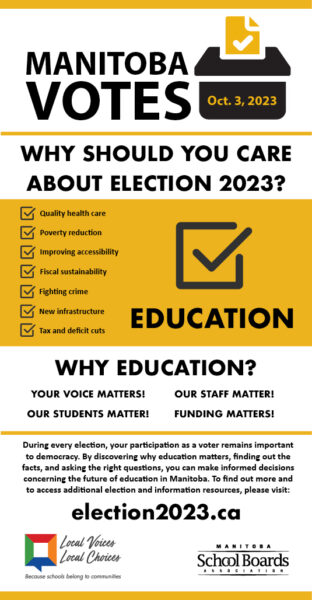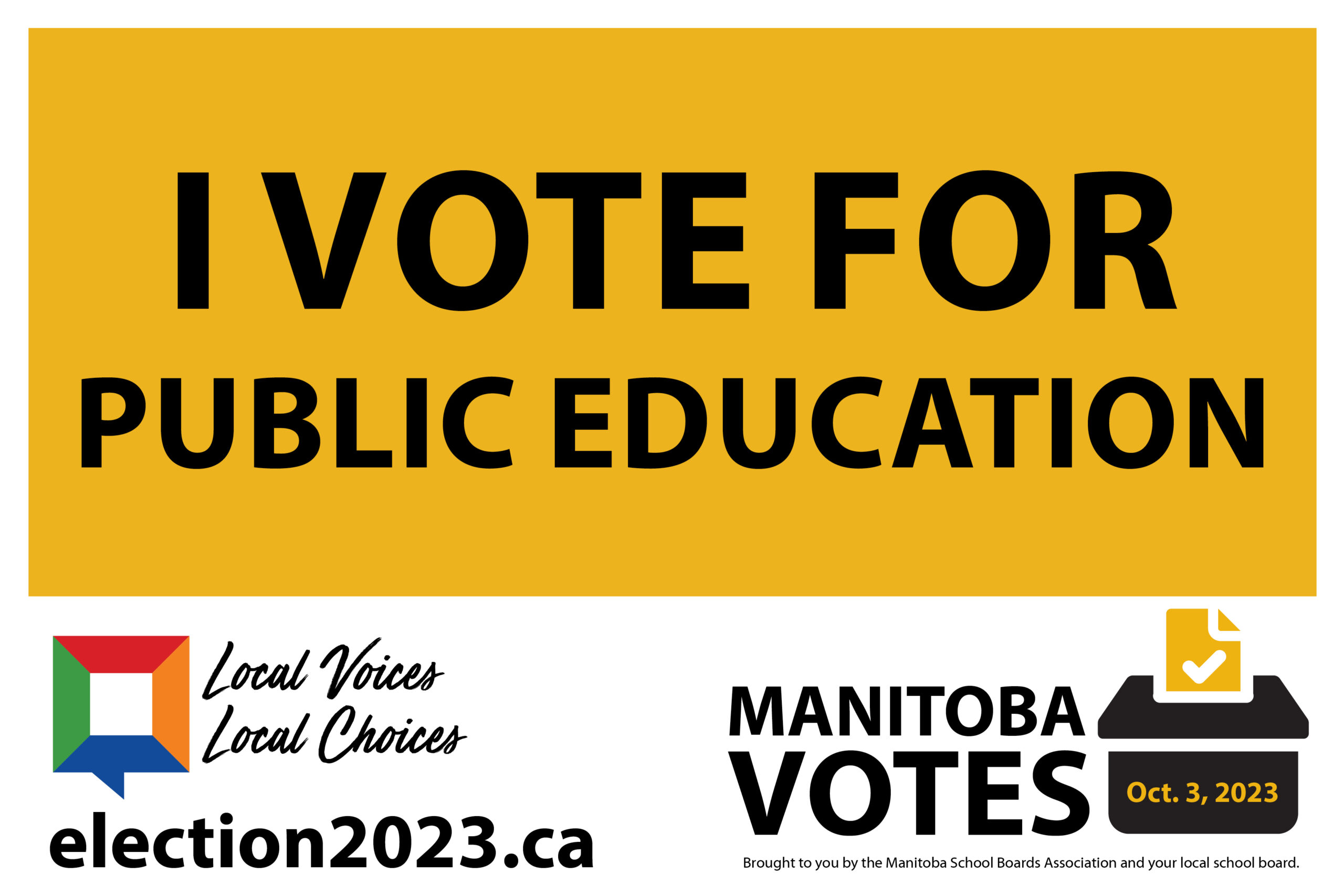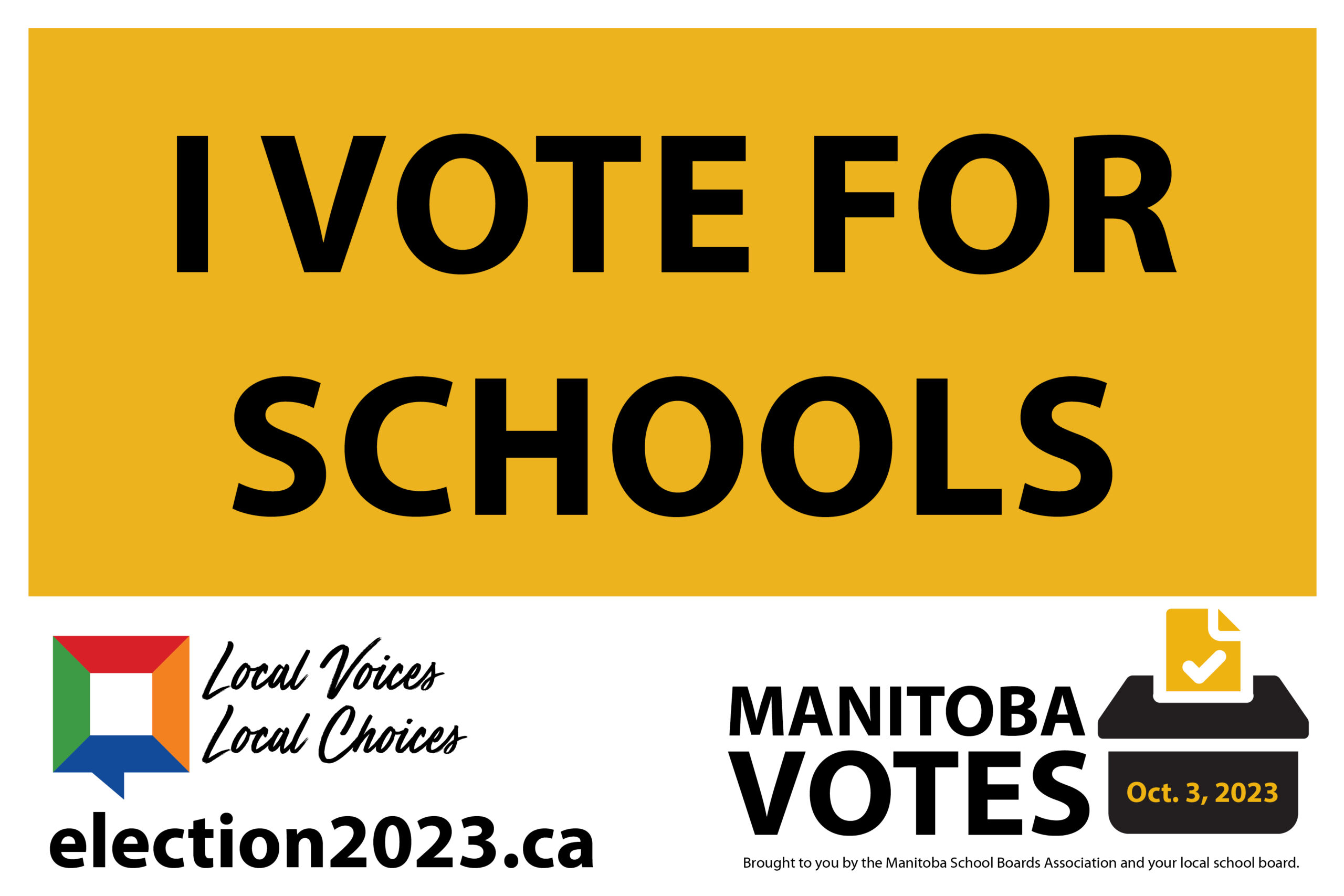Why should you care about Election 2023?
The provincial general election is scheduled to take place on October 3, 2023. There are several issues before Manitobans this election year; however, education must be a key priority. MSBA is encouraging voters to learn more about the reasons why, whether you have children in the school system or not, you should care about Election 2023.
 Why Education?
Why Education?
Your voice matters. The past four years have proven that Manitoba’s voice on education truly counts. Our students and schools continue to depend on you, as a voter, to share why education must remain a key priority with provincial candidates– both during election campaigns and during the years in between.
Election outcomes matter. The largest share of investment in students, staff and school programs and buildings, comes from the Manitoba government. Decisions made by the government play a central role in how education is delivered in each school division within Manitoba. All Members of the Legislative Assembly are responsible for supporting and sustaining education in your community.
Our students matter. Educational success depends on addressing many factors that influence our students’ lives. Addressing poverty; creating safe, healthy, inclusive and caring schools for everyone; moving forward on reconciliation with Indigenous peoples; building strong relationships and communication with families; and providing key community services, are all urgent priorities that require a balanced provincial response from our future elected officials. Schools alone cannot meet our students’ needs. It takes a village, along with sustainable government support, to raise a child.
Our staff matter. School boards rely upon our teachers and school employees, as essential frontline workers, to provide the very best education to our students. Manitoba’s provincial government plays a big role in making sure that our workforce is treated with respect through investments in their well-being: professionally, personally, and financially.
Funding matters. Two decades of provincial education budget plans have remained below the rate of inflation, meaning that in 2023, school programs, supports and services have become increasingly underfunded. This must be fixed in the years ahead. Our students deserve better.
Top Five Questions for Local, MLA Candidates
Education must be a key priority during the 2023 election. You know the facts on the current situation faced in our schools. Asking local candidates about their own, as well as their party’s future plans for public education, will certainly help you to best evaluate who deserves your vote. Alternatively, these questions can serve as valuable guideposts when reading the campaign statements and announcements made by political parties before the upcoming Provincial Election. Here are our suggestions for five powerful questions you can ask, to help inform your vote:
“If elected to office…
- What are your own, as well as your party’s plans to support education in the years ahead and does this plan speak to the next four years only, or to the next generation too?
- Does your party recognize that schools alone cannot address the complex needs of all students and if so, how will you and your party come alongside of schools to respond to poverty reduction, as well as to promote greater accessibility, inclusion and well-being for our students?
- Based on a recent survey[1], are you aware that a clear majority of Manitobans support increased “teacher salaries and benefits”, “providing more funding for schools”, and “added resources and supports for children and families” as their top priority for improving our schools, and does this also reflect your own, as well as your party’s priorities for improving our schools?
- Does your party have plans to address the current investment gap when it comes to school programs and services, with funding for maintaining school buildings themselves?
- Which features of Manitoba’s education system will stay the same, which aspects will change, and why?
[1] 51 per cent. Cited from Probe Research, December, 2021 Omnibus Survey. “Views on Manitoba’s Education System.”
Provincial Forum on Education - March 17, 2023
A Provincial Forum on Education was held on March 17, 2023 and was co-hosted by Manitoba’s five public education partners, including (in alphabetical order) the Manitoba Association of Parent Councils, the Manitoba Association of School Business Officials, the Manitoba Association of School Superintendents, the Manitoba School Boards Association and the Manitoba Teachers’ Society. The forum moderator was Michele Polinuk, retired Superintendent of the Lord Selkirk School Division and a valued member of the Interlake community.
Links to the pre-election forum responses from the Keystone Party of Manitoba and the Green Party of Manitoba are available in this section.


Party Election Platforms
Downloads
Op Ed Submissions/Media
"Parents are already involved in education", Op Ed., The Winnipeg Free Press, October 3, 2023
Candidate Forum (hosted by Lord Selkirk S.D.), The Selkirk Record, September 21, 2023
"Myth Busting - Change the Conversation to one that Matters to Rural Education", Op Ed., submitted by the Prairie Spirit School Division Board of Trustees to local newspapers
"Rural Education and the Provincial Election", Op Ed., submitted by the Prairie Spirit School Division Board of Trustees to local newspapers
"Make education an election priority", Op Ed., The Winkler Morden Voice, September 14, 2023
"High stakes for education", Op Ed., The Winnipeg Free Press, August 19, 2023
Related Links
Radio Campaign Ad (1st Voiceover)
Radio Campaign Ad (2nd Voiceover)
MANTRA (Manitoba Tobacco Reduction Alliance Inc.) and the Provincial Election
